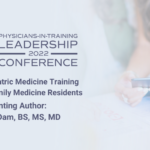Abstract | April 4, 2022
Improving Geriatric Medicine Training Outcomes in Family Medicine Residents
Learning Objectives
- On completion of this session, participants will understand the benefit of an improved geriatric curriculum for residents’ training.
- On completion of this session, participants will see areas of possible improvement in their own program’s geriatric education.
- On completion of this session, participants can see what areas residents can improve experience within geriatric medicine.
Population distribution of the United States is undergoing a change. This is partially due to the “baby boomer” population reaching the age of 65 and older, making 1 in 5 U.S. residents of geriatric age group. 2 With 7,000 geriatricians in practice, there is an underwhelming number of geriatric fellowshiptrained physicians compared to the number needed to support the population shift. 4-5 To bridge this gap, it is important to incorporate geriatric education into the curriculum of primary care trainees, e.g., family medicine residency programs. To assess and improve geriatric training among family medicine residents, a multi-phase quality improvement project was developed at an urban, academic family medicine residency program. A Qualtrics pre-survey (using a Likert scale multiple choice options) assessed current family medicine residents’ experiences, perceptions of their overall geriatric curriculum, and knowledge with geriatric patient care. Future phases include implementing rotation curriculum changes with a didactics series focused on geriatric topics based on reported level of confidence among residents. Post-curriculum change, we will gauge resident confidence with geriatric medicine. In-training exam scores will be followed to track improvement on residents’ knowledge. Initial findings reveal majority of residents feel areas of improvement include polypharmacy management, time spent with preceptor, and experience in homes and long term care facilities.
As part of a longitudinal quality improvement project to improve geriatric education in an academic family medicine residency program, we aimed to survey residents’ perceptions of their current geriatric training curriculum as well as track their geriatric in-training test scores. As we evaluate the perceptions of Family Medicine residents we seek to ultimately improve Geriatric Medicine training outcomes for Family Medicine residents throughout the country. We expect that other institutions may benefit from this project by implementing similar changes to better prepare their residents to care for the geriatric population. Programs can begin to introspectively look into their own Geriatric Medicine curriculum to see what areas can be improved, and what knowledge gaps need to be filled. Other institutions may benefit from implementing opportunities for more training experiences outside of traditional inpatient and outpatient settings, such as long-term care facilities and home care. In addition, other institutions may consider adding dedicated lectures or training curriculum to increase not only geriatric medicine knowledge but residents’ direct contact-experience with older adults.
References and Resources:
- An Aging Nation: Projected Number of Children and Older Adults. The US Census bureau. https://www.census.gov/library/visualizations/2018/comm/historic-first.htmll 09 Oct 2019.
- Older People Projected to Outnumber Children. https://www.census.gov/newsroom/pressreleases/2018/cb18-41-population-projections.html, The United States Census Bureau. February 04, 2021 October 10, 2019.
- Care of older adults. https://www.aafp.org/dam/AAFP/documents/medical_education_residency/program_directors/Reprint 264_Older.pdf American Acadeomy of Family Physicians. Reprint no. 264.
- lliance for Aging Research. Medical Never-Never Land: Ten Reasons Why America Isn’t Ready for the Coming Age Boom. Washington, DC: Alliance for Aging Research; 2002. https://www.agingresearch.org/publications/view/135#.WoIS8ZPwajg. Accessed February 12, 2018.
- Martin JC, Avant RF, Bowman MA, et al; Future of Family Medicine Project Leadership Committee. The Future of Family Medicine: a collaborative project of the family medicine community. Ann Fam Med. 2004;2(suppl 1):S3-S32. https://doi.org/10.1370/afm.130.

